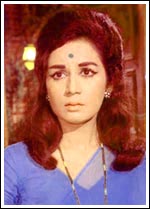
HOME | MOVIES | FEEDBACK |

Nanda was the good little girl of Hindi films
--- she was the Snow White who blushed rose red at the slightest
hint of any flirtation by the hero.
Blessed with a face innocent of any malice or calculation, Nanda
is remembered even today, as much for being Baby Nanda or the
chhoti bahen of her earlier films
as for her successful career as the soft-spoken heroine of some 40
films thereafter.
Not that Nanda didn't try to shatter her image. In Aashiq, she played a manipulative wife
while in Yash Chopra's Ittefaq, she
was the murderess. In The Train she
effectively donned the glamour doll mantle, too.
But Nanda's appeal is predominantly that of a winsome, if rather
teary-eyed, innocent.
Rather surprisingly, Nanda has lived a life marked by tragedy.
Her father, Master Vinayak, passed away when she was only eight
years old. He was a successful actor-director in the 1930s and
1940s. After his death, the family fortunes took a dip. Little
Nanda contributed to the family by working as a child artiste in
early fifties' films like Jaggu and
Angaarey.
V Shantaram, an associate of Master Vinayak, gave Baby Nanda her
big break when he cast her in his successful brother-sister saga
Toofan Aur Diya (1956). But success
did not come Nanda's way immediately.
She bravely refused to give in to the temptation of a regular
income which would come with being shackled by a long-term
contract to a big studio. Instead, she played sister to stars like
Raaj Kumar (Dulhan) or Dev Anand
(Kaala Bazaar) and doing small
roles in big films like Dhool Ka
Phool.
Nanda's ability to arouse the audience's protective instincts was
pronounced even then --- most noticeably in two weepies: Bhabhi (1957) and Chhoti Bahen (1959).
The title role of L V Prasad's Chhoti
Bahen and its superhit rakhsha
bandhan song Bhaiya mere rakhee ke
bandhan ko nibhana made Nanda a true blue star. The
audiences wept copiously along with Nanda, as they followed the
tear-soaked arc of her many travails (rejection from a beloved
brother, a tart-tongued sister-in-law, blindness et al), in the
film.
Nanda made the quantum leap from playing Dev Anand's sister in
Kaala Bazaar (1960) to playing his
heroine in Hum Dono (1961). From
playing the second lead in B R Chopra's production Dhool Ka Phool (1959), she was the
heroine of his next release, Kanoon
(1960).
Hum Dono was a triumph for Nanda.
She eloquently brought to life the dilemma of a wife confused by
her husband's (Dev Anand) remoteness, unaware that she is living
with his double.
Even while she was playing opposite A-listers like Dev Anand in
Hum Dono and Raj Kapoor in Aashiq, Nanda sportingly agreed to star
in films opposite newcomers like Dharmendra (Mera Kasoor Kya Hai) and Manoj Kumar
(Bedaag).
Nanda adopted this strategy throughout her career. Her willingness
to sign on a string of films with one unproven newcomer --- Shashi
Kapoor --- proved especially fortuitous. Their first film together
Chaar Deewari (1961) didn't do
well, but the star pair continued signing films till they hit the
jackpot with Jab Jab Phool Khile
(1965).
The candy-coloured Jab Jab Phool
Khile added a glamorous dimension to Nanda's image,
which had hitherto been that of a lachrymose girl in the junior
Meena Kumari mould. Think of Nanda's role as the morose,
wheelchair-bound heroine of Aaj Aur
Kal (1963). Or even the Dev Anand starrer Teen Deviyan, where Nanda seemed the
obvious choice as the most diffident and home-loving of the three
heroines (the other two being Kalpana and Simi).
In Jab Jab Phool Khile, Nanda was
equally convincing, whether as the Westernised memsaab who sways
in a gown to Yeh sama sama hai yeh pyar
ka or the distraught girlfriend who finds it difficult
to sympathise with her shikarawala
lover's culture shock.
The film, which inspired Raja
Hindustani 30 years later, was an unqualified
success.
The dichotomy between Nanda's earlier homely image and the demands of a more glamorous era in the late sixties saw her career being caught in the middle. Roles in hit films like Gumnaam (1965) didn't really make much demand on Nanda's indubitable histrionic prowess.
She had often been compared to her senior, the legendary Meena Kumari. The two finally came together in Abhilasha (1968) but the film didn't prove memorable.
In 1969, Nanda gave an enigmatic, finely-nuanced performance in Yash Chopra's songless whodunit, Ittefaq. Her oh-so-sweet image played its part in making the film a success --- Nanda was probably the last person the audience thought would turn out the murderer.
Films with new superstar Rajesh Khanna (The Train, Joru Ka Ghulam) followed but the actress couldn't adjust to the new working atmosphere of the seventies. After a touching cameo in Manoj Kumar's Shor (1972), Nanda gradually retreated from the film industry.
She surprised many people, including herself, when she returned in the early eighties to do precisely three films --- coincidentally all three Padmini Kolhapure starrers. Her histrionic maturity was clearly evident as the aging Devdasi in Ahista Ahista, as Dilip Kumar's wife in Mazdoor and as the hapless mother in Raj Kapoor's Prem Rog.
Sadly, she chose to retreat into the shadows thereafter. Waheeda Rehman, who had been friends with her ever since they co-starred in Kaala Bazaar, pestered her to get married. In 1992, Nanda finally said yes to noted director Manmohan Desai. The director's subsequent death made Nanda retreat further into her shell.
|
|||||||||
(c) 1996 - 2002 rediff.com India Limited. All Rights Reserved. |
||||||||||